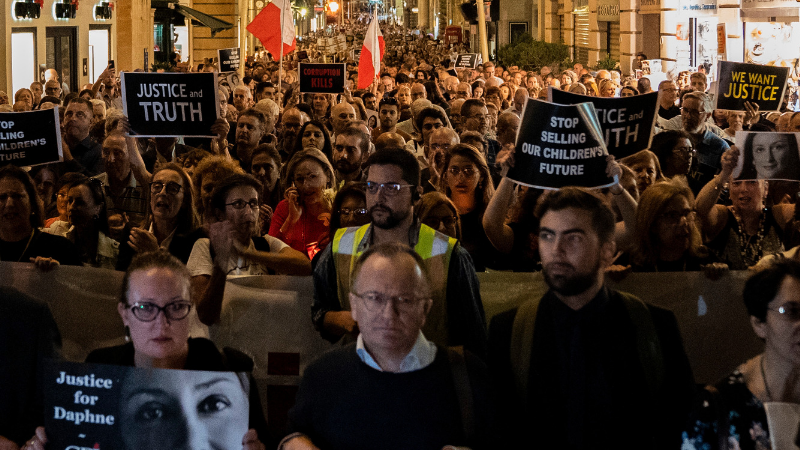In Malta, it’s never actually about the policies or the ideas that will shape our society. It’s about a tribal – and almost sectarian – identity.
Like football hooligans, the Maltese define themselves according to, and find meaning for existence in, the political team they support – with little regard for the game itself.
Many don’t actually understand the rules on the pitch, and some aren’t even in the stadium – they’re standing outside battling with rival teams.
By this I mean that someone like Helen Cutajar, the ardent supporter of her beloved Labour Party who was filmed in an assault on an activist at the protest memorial last week, has almost certainly never picked up Marx’s ’Das Kapital’ or Thomas Paine’s ‘The Rights of Man’. It is safe to assume she hasn’t read Keynes or Adam Smith or John Locke either.
Helen Cutajar’s notion of what ‘Labour’ means probably doesn’t extend beyond the każin (club) where she takes pictures with Labour politicians, and the myths she has been steeped in by her family and friends. It is a parochial, insular and self-limiting world view.
Don’t get me wrong, I’m not suggesting you need a degree in political science to lay claim to any Party or cause, but you do need to be able to interrogate your own beliefs to know what it is you really stand for.
I say this as someone who voted Labour in 2013. I say this because I know that what was promised was not what the country got. And when we are sold lies, it is our duty to point it out rather than continue a blind following of those who have used and abused our trust.
At the very least you should have a fairly solid understanding of the Party’s history. Yet our ability to reflect on the past in the hopes of learning from it has been significantly hampered by two issues: our tradition of valuing blind faith over self-critique and introspection, and and our relationship with history itself.
A large chunk of Malta’s records on its most tumultuous political history has been destroyed. Audiovisual archives at the State broadcaster were destroyed, stolen and erased in the lead up to the 1987 election when the regime was changed.
Newspaper records were also destroyed when former Labour Prime Minister Dom Mintoff’s henchmen burned The Times of Malta building in October 1979 (the same month, 39 years later, Daphne Caruana Galizia’s pen was silenced under another Labour regime).
Then there’s the issue of certain academics at the University of Malta – closely connected to the Labour Party – who banned theses from students wanting to conduct research on those dark days in Malta’s history. This only emerged because other University professors were shocked and disgusted by this behaviour.
The idea is to erase the past in all senses – not recording oral history or eye witness accounts allows for history to be erased, forgotten and rewritten according to Labour. It’s Orwellian. But Helen Cutajar may have never heard of Orwell either.
A Labour stalwart this government appointed as National Book Council chairman, Mark Camilleri, did release ‘A Materialist Revision of Maltese History 1919-1979′ but immediately put paid to any pretence of objectivity or dispassionate analysis by also declaring his glowing admiration for Mintoff. So we have yet another distorted view of history to fill the gap.
Mintoff himself understood the importance of manipulating the Labour image by restricting access to potentially critical information – at one point his administration even attempted to ban contact between foreign embassies and members of the Opposition, the Nationalist Party, a move that was roundly rejected internationally.
The Helen Cutajars of the island – of which there are many – are Labour’s crowning achievement. Weaponising the population’s propensity for credulity and gullibility, miring them in myth and spin as opposed to accessible, credible information, Muscat has continued the Party’s tradition of convincing its followers that to be working class is synonymous with being classless, ignorant and intolerant.
Never mind that the Labour leader and his wife have followed in the Socialist tradition of rambling against the elite while they themselves live lives of luxury off the people’s back, those same people forced to live in garages in Malta’s “best times”. But hey, they are happy to call them their “king” and “queen” – what socialism?
It actually reflects the PL’s fundamental contempt for its supporters that it encourages and applauds aggression, intimidation and mob rule. There’s an implicit condescension in there, indicating that the Party does not hold its voters to a higher standard – indeed, it expects no better of them. There is ample evidence of this in Labour’s secret online groups exposed by The Shift News.
It is not simply money that the Labour Party is stealing from the Maltese – be it through the Vitals scandal, Cafe Premiere, the so-called ‘American University’, the Panama accounts, or the LNG tanker (to name but a few) – nor is it simply their access to a healthy ecosystem and environment, and air that is actually safe to breathe.
It isn’t just their freedom of speech or right to protest that Labour are successfully convincing them to give up (unless they say what the Party dictates), nor is it merely their right to impartial and honest institutions.
No, the Labour Party – by obscuring history and perpetuating the myths that are the Party’s lifeblood – is stealing the Maltese people’s future.
Even as Muscat claims to have started a process of modernisation, he and his Party are further entrenching the Maltese in the past – a past that seemingly gives people like Helen Cutajar the licence to bully Daphne Caruana Galizia’s family, revel in her death, and attack peaceful activists. And they say call themselves “progressive”.












